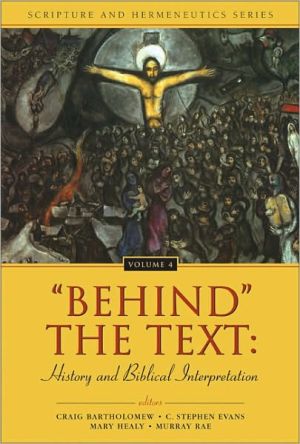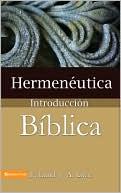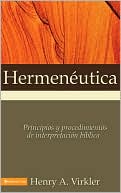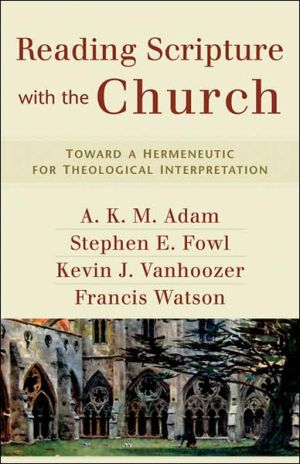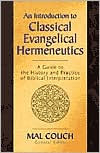"Behind" the Text: History and Biblical Interpretation, Vol. 4
Christianity believes in a God who acts in history. The Bible tells us the story of God's actions in Israel, culminating in the ministry of Jesus of Nazareth and the spreading of the gospel from Jerusalem to Rome. The issue of history is thus unavoidable when it comes to reading the Bible Volume 4 of the Scripture and Hermeneutics Series looks at how history has dominated biblical studies under the guise of historical criticism. This book explores ways in which different views of history...
Search in google:
The fourth in a series of books that result from annual conferences of the top evangelical hermeneutical scholars in the world. The topic for this book probes contemporary theories on the philosophy and theology of history and analyzes how those views intersect with the concept of the Bible as history.
"Behind" The Text: History and Biblical Interpretation\ \ Zondervan\ Copyright © 2003 University of Gloucestershire and the British and Foreign Bible Society\ All right reserved.\ ISBN: 0-310-23414-X \ \ \ \ Chapter One\ Two (or More) Kinds of Scripture Scholarship \ Alvin Plantinga\ The serious and scholarly study of the Bible is of first importance for the Christian community. The roll call of those who have pursued this project is maximally impressive: Chrysostom, Augustine, Aquinas, Calvin, Jonathan Edwards and Karl Barth, just for starters. These people and their successors begin from the idea that Scripture is indeed divinely inspired (however exactly they understand this claim); they then try to ascertain the Lord's teaching in the whole of Scripture or (more likely) a given bit. Since the Enlightenment, however, another kind of Scripture scholarship has also come into view. Variously called 'higher criticism', 'historical criticism', 'biblical criticism', or 'historical critical scholarship', this variety of Scripture scholarship brackets or prescinds from what is known by faith and aims to proceed 'scientifically', strictly on the basis of reason. I shall call it 'Historical Biblical Criticism' - HBC for short. Scripture scholarship of this sort also brackets the belief that the Bible is a special word from the Lord, as well as any other belief accepted on the basis of faith rather than reason.\ Now it often happens that the declarations of those who pursue this latter kind are in apparent conflict with the main lines of Christian thought; one who pursues this sort of scholarship is quite unlikely to conclude, for example, that Jesus was really the pre-existent second person of the divine trinity who was crucified, died, and then literally rose from the dead the third day. As Van Harvey says, 'So far as the biblical historian is concerned, ... there is scarcely a popularly held traditional belief about Jesus that is not regarded with considerable skepticism.' I shall try to describe both of these kinds of Scripture scholarship. Then I shall ask the following question: how should a traditional Christian, one who accepts 'the great things of the gospel', respond to the deflationary aspects of HBC? How should she think about its apparently corrosive results with respect to traditional Christian belief? I shall argue that she need not be disturbed by the conflict between alleged results of HBC and traditional Christian belief. Indeed, that conflict should not defeat her acceptance of the great things of the gospel - nor, to the degree that those alleged results rest upon epistemological assumptions she does not share, of anything else she accepts on the basis of Biblical teaching.\ Scripture Divinely Inspired\ At millions of worship services every week Christians all over the world hear passages of Scripture and respond by saying, 'This is the Word of the Lord.' Suppose we begin, therefore, by inquiring into the epistemology of the belief that the Bible is divinely inspired in a special way, and in such a way as to constitute divine discourse. How does a Christian come to believe that the gospel of Mark, or the book of Acts, or the entire New Testament is authoritative, because divinely inspired? What (if anything) is the source of its warrant? There are several possibilities. For many, it will be by way of ordinary teaching and testimony. Perhaps I am brought up to believe the Bible is indeed the Word of God (just as I am brought up thinking that thousands perished in the American Civil War), and I have never encountered any reason to doubt this. But an important feature of warrant is that if I accept a belief B just on testimony, then B has warrant for me only if it had warrant for the testifier as well: the warrant a belief has for the testifiee is derivative from the warrant it has for the testifier. Our question, therefore, becomes this: what is the epistemological status of this belief for those members of the community who do not accept it on the testimony of other members? What is the source of the warrant (if any) this belief has for the Christian community? Well, perhaps a Christian might come to think something like the following:\ Suppose the apostles were commissioned by God through Jesus Christ to be witnesses and representatives (deputies) of Jesus. Suppose that what emerged from their carrying out this commission was a body of apostolic teaching which incorporated what Jesus taught them and what they remembered of the goings-on surrounding Jesus, shaped under the guidance of the Spirit. And suppose that the New Testament books are all either apostolic writings, or formulations of apostolic teaching composed by close associates of one or another apostle. Then it would be correct to construe each book as a medium of divine discourse. And an eminently plausible construal of the process whereby these books found their way into a single canonical text, would be that by way of that process of canonization, God was authorizing these books as together constituting a single volume of divine discourse.\ So a Christian might come to think something like the above: she believes\ (1) that the apostles were commissioned by God through Jesus Christ to be witnesses and deputies,\ (2) that they produced a body of apostolic teaching which incorporates what Jesus taught, and\ (3) that the New Testament books are all either apostolic writings or formulations of apostolic teaching composed by close associates of one or another apostle. She also believes\ (4) that the process whereby these books found their way into a single canon is a matter of God's authorizing these books as constituting a single volume of divine discourse. She therefore concludes that indeed\ (5) the New Testament is a single volume of divine discourse.\ But of course our question then would be: how does she know, why does she believe each of (1)-(4)? What is the source of these beliefs?\ Could it be, perhaps, by way of ordinary historical investigation? I doubt it. The problem is the Principle of Dwindling Probabilities. Suppose a Christian proposes to give a historical argument for the divine inspiration and consequent authority of the New Testament; and suppose we think of her as already knowing or believing the central truths of Christianity. She already knows that there is such a person as God, that the man Jesus is also the divine Son of God, that through his ministry, passion, death and resurrection we sinners can have life. These constitute part of her background information, and can be employed in the historical argument in question. Her body of background information B with respect to which she estimates the probability of (1)-(4), includes the main lines of Christian teaching. And of course she knows that the books of the New Testament - some of them, anyway - apparently teach or presuppose these things. With respect to B, therefore, perhaps each of (1)-(4) could be considered at least quite plausible and perhaps even likely to be true.\ Still, each is only probable. Perhaps, indeed, each is very likely and has a probability as high as .9 with respect to that body of belief B. Even so, we can conclude only that the probability of their conjunction, on B, is somewhat more than .5. In that case, belief that the New Testament is the Word of God would not be appropriate; what would be appropriate is the belief that it is fairly likely that the New Testament is the Word of God. (The probability that the next throw of this die will not come up either 1 or 2 is greater than .5; that is nowhere nearly sufficient for my believing that it will not come up 1 or 2.) Of course, we could quibble about these probabilities - no doubt they could sensibly be thought to be greater than I suggested. No doubt; but they could also sensibly be thought to be less than I suggested. The historical argument for (1) to (4) will at best yield probabilities, and at best only a fairly insubstantial probability of (5) itself. The estimates of the probabilities involved, furthermore, will be vague, variable and not really well founded. If the belief in question is to have warrant for Christians, its epistemic status for them must be something different from that of a conclusion of ordinary historical investigation.\ Now, of course, most Christian communities have taught that the warrant enjoyed by this belief is not conferred on it just by way of ordinary historical investigation. The Belgic Confession, one of the most important confessions of the Reformed churches, gives a list (the Protestant list) of the canonical books of the Bible (Article 5); it then goes on:\ And we believe without a doubt all things contained in them - not so much because the church receives them and approves them as such, but above all because the Holy Spirit testifies in our hearts that they are from God, and also because they prove themselves to be from God.\ There is a possible ambiguity here; 'we believe all things contained in them not so much because the church receives them, but ...' - but to what does this last 'them' refer? The teachings contained in the books, or the books themselves? If the former, then what we have here is the claim that the Holy Spirit is leading us to see, not that a given book is from God, but that some teaching - e.g., that God in Christ was reconciling the world to himself - is indeed true. If the latter, however, what we would be led to believe is such propositions as The gospel of John is from God. I think it is at least fairly clear that the latter is what the Confession intends. According to the Confession, then, there are two sources for the belief that (e.g.) the gospel of John is from God. The first is that the Holy Spirit testifies in our hearts that this book is indeed from God; the Holy Spirit does not merely impel us to believe, with respect to a given teaching of the gospel of John, that it is from God, but also impels us to believe that the gospel of John itself is from God. The second is that the book 'proves itself' to be from God. Perhaps here the idea is that the believer first comes to think, with respect to many of the specific teachings of that book, that they are indeed from God; that is, the Holy Spirit causes her to believe this with respect to many of the teachings of the book. She then infers (with the help of other premises) that the whole book has that same status.\ This is only one way in which this belief could have warrant; there are other possibilities. Perhaps the believer knows by way of the internal invitation of the Holy Spirit that the Holy Spirit has guided and preserved the Christian church, making sure that its teachings on important matters are in fact true; then the believer would be warranted in believing, at any rate of those books of the Bible endorsed by all or nearly all traditional Christian communities, that they are from God. Or perhaps, guided by the Holy Spirit, she recapitulates the process whereby the canon was originally formed, paying attention to the original criteria of apostolic authorship, consistency with apostolic teaching, and the like, and relying on testimony for the propositions such and such books were indeed composed by apostles. There are also combinations of these ways. However precisely this belief receives its warrant, then, traditional Christians have accepted the belief that the Bible is indeed the Word of God and that in it the Lord intends to teach us truths.\ Traditional Christian Biblical Commentary\ Of course, it is not always easy to tell what the Lord is teaching us in a given passage: what he teaches is indeed true, but sometimes it is not clear just what his teaching is. Part of the problem is the fact that the Bible contains material of so many different sorts; it is not in this respect like a contemporary book on theology or philosophy. It is not a book full of declarative sentences, with proper analysis and logical development and all the accoutrements academics have come to know and love and demand. The Bible does indeed contain sober assertion; but there is also exhortation, expression of praise, poetry, the telling of stories and parables, songs, devotional material, history, genealogies, lamentations, confession, prophecy, apocalyptic material, and much else besides. Some of these (apocalyptic, for example) present real problems of interpretation (for us, at present): what exactly is the Lord teaching in Daniel, or Revelation? That is not easy to say.\ And even if we stick to straightforward assertion, there are a thousand questions of interpretation. Here are just a couple of examples. In Matthew 5:17-20, Jesus declares that not a jot or a tittle of the Law shall pass away and that '... unless your righteousness surpasses that of the Pharisees and the teachers of the law, you will certainly not enter the kingdom of heaven', but in Galatians Paul seems to say that observance of the Law does not count for much; how can we put these together? How do we understand Colossians 1:24: 'Now I rejoice in what was suffered for you, and I fill up in my flesh what is still lacking in regard to Christ's afflictions, for the sake of his body which is the church'? Is Paul suggesting that Christ's sacrifice is incomplete, insufficient, that it requires additional suffering on the part of Paul and/or the rest of us? That seems unlikely. Is it that our suffering can be a type of Christ's, thus standing to the latter in the relation in which a type stands to the reality it typifies? Or shall we understand it like this: we must distinguish between two kinds of Christ's suffering, the redemptive suffering, the expiatory and vicarious atonement to which nothing can be added or taken away, on the one hand, and another kind, also 'for the sake of his body', in which we human beings can genuinely participate? Perhaps it is suffering which can build up, edify the body of Christ, even as our response to Christ can be deepened by our meditating on Christ's sacrifice for us and the amazing selfless love displayed in it? Or what? Do Paul and James contradict each other on the relation between faith and works? Or rather, since God is the author of Scripture, is he proposing an inconsistent or self-contradictory teaching for our belief ? Well no, surely not, but then how shall we understand the two in relation to each other? More generally, given that God is the principal author of Scripture, how shall we think about the apparent tensions the latter displays?\ Scripture, therefore, is indeed inspired: what it teaches is indeed true; but it is not always trivial to tell what it does teach. Indeed, many of the sermons and homilies preached in a million churches every Sunday morning are devoted in part to bringing out what might otherwise be obscure in Scriptural teaching.\ \ Continues...\ \ \ \ Excerpted from "Behind" The Text: History and Biblical Interpretation Copyright © 2003 by University of Gloucestershire and the British and Foreign Bible Society. Excerpted by permission.\ All rights reserved. No part of this excerpt may be reproduced or reprinted without permission in writing from the publisher.\ Excerpts are provided by Dial-A-Book Inc. solely for the personal use of visitors to this web site. \ \
ContributorsxiiiAcknowledgementsxviAbbreviationsxviiThe ArtistsxixExodus 1952-66xxiIntroduction1Introduction: Chagall's Exodus and the Swart-Benjamin Reworking1The Twists and Turns to the Present2Content of this Volume12Historical Criticism--Critical Assessments1.Two (or More) Kinds of Scripture Scholarship19Scripture Divinely Inspired20Traditional Christian Biblical Commentary23Historical Biblical Criticism27Why Are Not Most Christians More Concerned?40Nothing to Be Concerned About50Concluding Coda552.Warranted Biblical Interpretation: Alvin Plantinga's 'Two (or More) Kinds of Scripture Scholarship'58Introduction58Philip Davies and Epistemology and Biblical Interpretation59Postmodernism, Classical Foundationalism and Biblical Interpretation64Plantinga and Warranted Christian Belief66Warranted Biblical Interpretation?68Quo Vadis?713.A Warranted Version of Historical Biblical Criticism? A Response to Alvin Plantinga79The Principal Author81The Value of HBC84Whence Came HBC?88In Conclusion894.Reason and Scripture Scholarship: A Response to Robert Gordon and Craig Bartholomew925.Do You Want Us to Listen to You?101Introduction101Critical Studies of the New Testament and the User of the New Testament1046.Taking Soundings: History and the Authority of Scripture: A Response to Peter van Inwagen131Introduction131Historical Reliability: What Does It Mean and How Should It Be Assessed?132Arguments Used to Circumvent the Difficulties Surrounding the Notion of Historical Reliability134Does the Authority of the New Testament Depend upon the Notion of Historical Reliability?1367.Which Conversation Shall We Have? History, Historicism and Historical Narrative in Theological Interpretation: A Response to Peter van Inwagen141'Users', 'Critical Studies' and 'History'142Reframing History1458.Historical Criticism of the Synoptic Gospels151Introduction151The Criterion of Dissimilarity154Bultmann and the Jesus Seminar156A Critique of the Criterion of Dissimilarity162Other Uses of the Criterion171Arguments from Traditional Wisdom and Earlier Literature172Appeals to What Is Most Memorable176Conclusion1799.Behind, in Front of ... or Through the Text? The Christological Analogy and the Lost World of Biblical Truth181Kant and the Failed Quest for Historical 'Being-in-Itself'182The Mediating Function of Narrative184The Vertical Dimension of Biblical Narrative and Its Implications for Exegesis187Biblical Inspiration and the Christological Analogy19010.The Place of History in Catholic Exegesis: An Examination of the Pontifical Biblical Commission's The Interpretation of the Bible in the Church196Introduction196Catholic Exegesis and History200The Pontifical Biblical Commission and the Historical-Critical Method209Evaluation217Rethinking History11.Knowing and Believing: Faith in the Past229The Scientific Model of Historiography231The Scientific Model of Historiography Reviewed237Testimony, Tradition and the Past243Knowing about the History of Israel253Conclusion26212.Creation and Promise: Towards a Theology of History267Introduction267Disengagement from History in Western Thought268History and Hermeneutics279Towards a Theology of History283The Doctrine of Creation284God at Work in Israel: Promise and Fulfilment287History and Hermeneutics Revisited295Tradition and History13.The Conflict of Tradition and History303Goethe's Observation303The Conflict of Tradition and History304Soren Kierkegaard31114.Tradition, Biblical Interpretation and Historical Truth320Is There Such a Thing as the Rule of Faith?321Is Interpreting by the Rule of Faith Consistent with Sola Scriptura?324Is Interpretation by the Rule of Faith Viciously Circular?327History and Narrative15.Ricoeur on History, Fiction, and Biblical Hermeneutics339Introduction339History and Historical Discourse341Historical Discourse and Fictional Literature: The Turn to Literature344Historical Discourse, Fictional Literature and the Bible352Conclusion35616.(Pre) Figuration: Masterplot and Meaning in Biblical History363Narrative Structure, Historiography and World-View365Meaning and History369Biblical Metanarrative and Historiography373Vernacular Literary Understanding as Interpretation382History and Biblical Interpretation17.Reconstructing and Interpreting Amos's Literary Prehistory: A Dialogue with Redaction Criticism397From Amos's Ipsissima Verba to the Book's Literary Prehistory398Sherlock Holmes or Dr Watson? Some Reflections on the Quest for Amos's Literary Prehistory410Has the Handmaiden Overreached Herself?43018.What Lesson Will History Teach? The Book of the Twelve as History443Context443Gerhard von Rad445The Twelve447Transition450How to Introduce the Prophets?451The Shape of the Twelve454Final Remarks46519.Divine Speaking as Godly Action in Old Testament Narrative: The Metaphysics of Exodus 14470Introduction470Divine Speech the Key to God the Self-Determining Self: Karl Barth on the Priestly Creation Narrative474From Exodus to Promised Land: YHWH the Judging yet Forbearing Divine Identity481The Reed Sea Narrative484Divine Speaking as Divine Action485Conclusion48920.Inhabiting the Story: The Use of the Bible in the Interpretation of History492Introduction492Inhabiting Biblical Narrative495Escaping the Anxieties of Interpretation498Figural Interpretation Today506Conclusion516University of Gloucestershire521The British and Foreign Bible Society522Baylor University524Scripture Index525Names Index529Subject Index537
